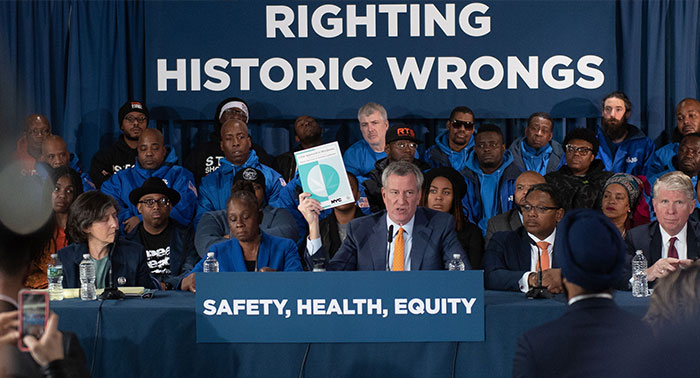Photo Courtesy of Michael Appleton/Mayoral Photography Office
Mayor Bill de Blasio said he has “been convinced that we can establish a regulatory framework that keeps our streets safe, rights the wrongs of the past, and gives economic opportunity to communities hit hardest by the war on drugs.”
By Michael V. Cusenza
Mayor Bill de Blasio on Thursday endorsed the “safe and fair” legalization of marijuana in the Big Apple, days after Gov. Andrew Cuomo highlighted legalizing adult use of recreational marijuana as one of his 2019 Justice Agenda proposals.
De Blasio also released the Mayor’s Task Force on Cannabis Legalization report on Thursday, which calls for a strong, public health-focused regulatory framework and the empowerment of local government to prevent corporate greed, foster small businesses and meet the demands of communities across the five boroughs.
De Blasio convened the task force in July to identify the goals and challenges that should guide the City’s preparations for potential legalization. According to the mayor, if recreational use of marijuana were legalized, the City would seek to:
• Create local licensing programs, regulate public places of consumption, regulate home and commercial cultivation and manufacturing, and regulate home delivery services.
• Establish zoning and area restrictions for cannabis businesses, as well as restrictions on the density to determine how the location of cannabis businesses can best fit into the fabric of its communities.
• Enforce age limits of 21 and over with civil rather than criminal penalties to violations of cannabis regulations to the greatest extent possible consistent with public safety.
• Recommend automatic expungement of criminal records relating to conduct that may be legalized, including personal use and possession of certain quantities – subject to notice and opportunity by district attorneys’ offices to raise objections in specific cases.
• Recommend statewide standards for product safety, labeling and packaging, marketing, and advertising, as well as a mandatory seed-to-sale tracking system accessible to State and local regulators and financial institutions serving cannabis-related businesses.
• Work with State authorities to reduce the risk of market domination by big businesses and foster sustainable growth, in part, by restricting businesses from owning and controlling each stage of the supply chain, which may otherwise be owned by different, specialized businesses.
• Participate in a dual state-local licensing structure that will permit the City to pursue its own innovations to promote economic opportunities created by this new market, subject to the minimum standards set by the State.
• Advocate for legislation expressly providing that banking and professional services for cannabis-related businesses do not violate State law.
• Allocate tax revenue, licensing fees, and other sources of financing to administer the new industry and support cannabis businesses and workers, with a focus on target populations and community reinvestment.
• Develop an incubator program to provide direct support to equity applicants in the form of counseling services, education, small businesses coaching, and compliance assistance.
While legalization seems to gain steam by the day, there are elected City officials who do not approve. Queens District Attorney Richard Brown noted on Thursday that while he encourages “thoughtful public debate” on the subject, he ultimately is not in favor green-lighting recreational consumption of the green.
“Respectfully I don’t believe anyone can say that legalization of marijuana is a positive step for our society or society or our children,” Brown said. “If memory serves me correctly, until fairly recently both the governor and the mayor felt the same way.”
The district attorney also said that deliberation over the legalization of recreational marijuana consumption “is finally moving to the forum that it should have been in all along—the New York State Legislature. The Legislature created the law and I have long said if the law is to be changed, it is the Legislature alone that should change it. It should not be changed by simply ignoring the laws that currently exist.”
Additionally, Brown cited a memorandum issued earlier this year by the State Association of County Health Officials that opposed the legalization of recreational marijuana. He also pointed to a study in Colorado released in September that stated that since marijuana legalization in Colorado in 2014, marijuana-related traffic deaths increased 151 percent and all traffic deaths by 35 percent. Colorado past month marijuana use shows an increase of 45 percent compared to the three-year average prior to the legalization of recreational marijuana in the state. Colorado past month marijuana use for ages 12 and older is ranked third in the nation and is 85 percent higher than the national average. The yearly rate of emergency room visits related to marijuana also increased by 52 percent after legalization, Brown noted.
“No state that has legalized recreational marijuana has legalized the public burning or smoking while driving—nor apparently does New York intend to. Yet the vast majority of arrests for marijuana stem from those activities,” the DA added. “So however violations of the new law are classified, we may face the same disparity issues we currently face now.”

